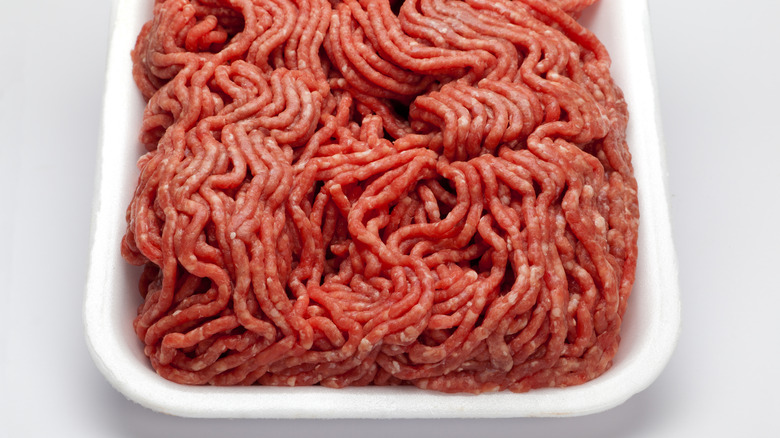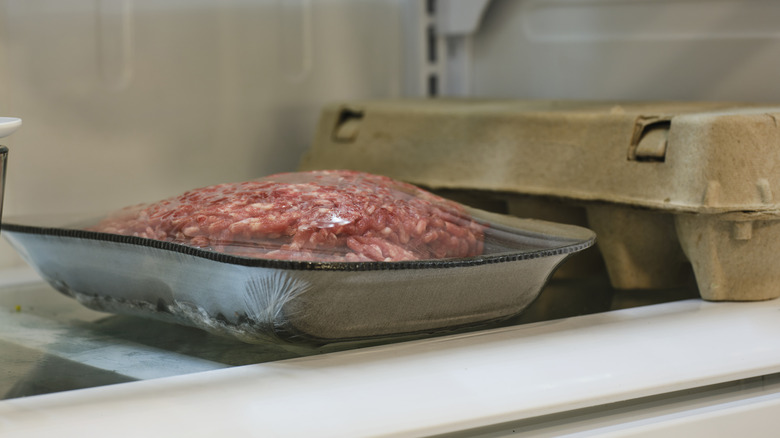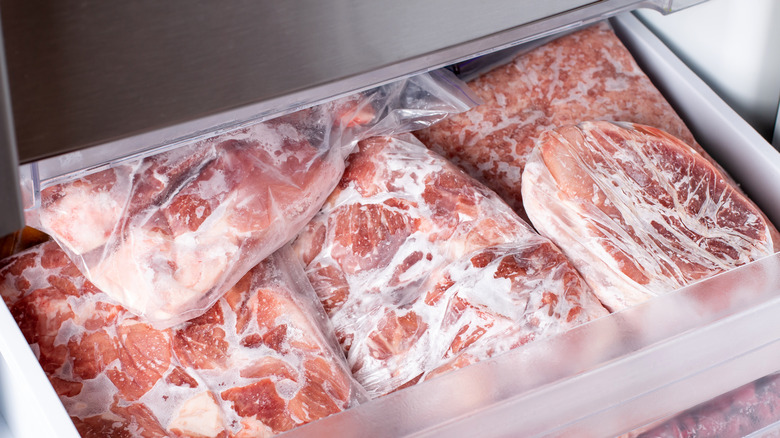Here's How Long Your Freshly Ground Beef Can Last In The Fridge
Anyone who's filled a cart with groceries knows how fast food can spoil. At the start of the week, you load the kitchen with fresh veggies, delectable fruits, and meat. By the end of the week, you're wading through a sea of leftovers, wondering what's still safe to eat in the back of your refrigerator. According to the US Department of Health and Human Services (HHS), one in six Americans fall victim to food poisoning every year. With rates that high, it's well worth learning how to store food items correctly.
Safety precautions are especially important when it comes to ground beef. According to the United States Department of Agriculture (USDA), ground beef has the potential to be contaminated with E. coli, a harmful bacteria that can cause severe illness. To make sure you're enjoying ground beef while it's fresh and to reduce the chances of food-borne illness, it's important to know that ground beef shouldn't sit for more than a few days in the refrigerator.
The safe window
After purchasing ground beef, you should prepare it fairly quickly. The HHS states that ground beef should only be refrigerated for one to two days. After that window, the beef becomes dangerous to eat. This might seem like a short period, but it's plenty of time for bacteria to start multiplying. This is especially true of ground beef. As the USDA notes, the grinding process mixes any bacteria that were present on the surface into the interior of the meat. This will kickstart bacteria colonization. Pathogens like E. coli can survive refrigerator temperatures and will slowly start multiplying if present.
The trickiest part of storing ground beef is knowing how to tell that your beef is going bad. "Ground beef is a particular concern," notes Dr. Lillian Craggs-Dino in an interview with the Cleveland Clinic, "because its spoilage isn't always as obvious as other products." Unlike other foods that develop mold, ground beef might "be starting to spoil, and you might not notice anything." That's why it's essential not to exceed the HHS refrigeration guidelines.
Other cuts of beef have a longer shelf life. Steaks, chops, and roasts can stay refrigerated for three to five days and sausage will last for up to a week. The HHS states that once cooked, all cuts of beef should be consumed within three to four days.
Try freezing ground beef
If you're worried about ground beef or other meats spoiling, you can always freeze your beef. Meat will last much longer when stored at freezing temperatures. According to the HHS, frozen ground beef should be good for three to four months. Cuts that haven't been ground will last up to a year. The HHS notes that, unlike refrigeration, freezing timelines are based on food quality and not safety. Foods stored at zero degrees Fahrenheit and below will last indefinitely.
To prevent freezer burn and prolong the life of your frozen meat, make sure to seal packages correctly. In an article in Popular Science, food scientist Kenji Lopez-Alt warns that "most household plastic wraps are actually permeable to air and water vapor." This makes them vulnerable to freezer burn. Instead, you can try using vacuum-sealed bags constructed with tougher plastics. If you don't have a vacuum sealer, Lopez-Alt recommends wrapping food tightly in aluminum foil and then wrapping that package in plastic.


